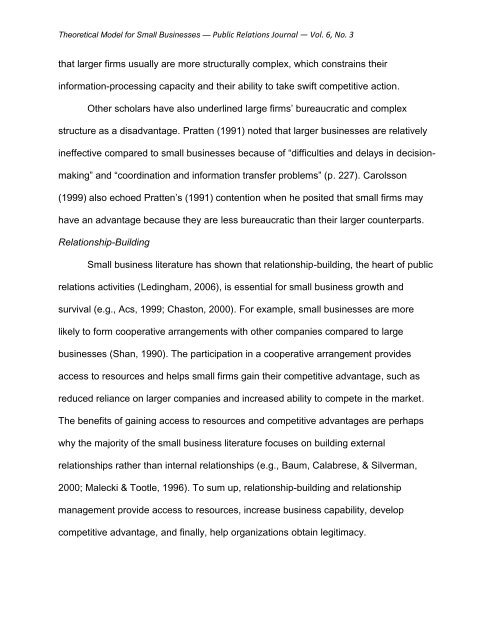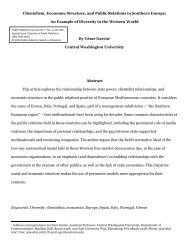Conceptualizing a Theoretical Model for the Practice of Public ...
Conceptualizing a Theoretical Model for the Practice of Public ...
Conceptualizing a Theoretical Model for the Practice of Public ...
Create successful ePaper yourself
Turn your PDF publications into a flip-book with our unique Google optimized e-Paper software.
<strong>Theoretical</strong> <strong>Model</strong> <strong>for</strong> Small Businesses — <strong>Public</strong> Relations Journal — Vol. 6, No. 3<br />
that larger firms usually are more structurally complex, which constrains <strong>the</strong>ir<br />
in<strong>for</strong>mation-processing capacity and <strong>the</strong>ir ability to take swift competitive action.<br />
O<strong>the</strong>r scholars have also underlined large firms’ bureaucratic and complex<br />
structure as a disadvantage. Pratten (1991) noted that larger businesses are relatively<br />
ineffective compared to small businesses because <strong>of</strong> “difficulties and delays in decisionmaking”<br />
and “coordination and in<strong>for</strong>mation transfer problems” (p. 227). Carolsson<br />
(1999) also echoed Pratten’s (1991) contention when he posited that small firms may<br />
have an advantage because <strong>the</strong>y are less bureaucratic than <strong>the</strong>ir larger counterparts.<br />
Relationship-Building<br />
Small business literature has shown that relationship-building, <strong>the</strong> heart <strong>of</strong> public<br />
relations activities (Ledingham, 2006), is essential <strong>for</strong> small business growth and<br />
survival (e.g., Acs, 1999; Chaston, 2000). For example, small businesses are more<br />
likely to <strong>for</strong>m cooperative arrangements with o<strong>the</strong>r companies compared to large<br />
businesses (Shan, 1990). The participation in a cooperative arrangement provides<br />
access to resources and helps small firms gain <strong>the</strong>ir competitive advantage, such as<br />
reduced reliance on larger companies and increased ability to compete in <strong>the</strong> market.<br />
The benefits <strong>of</strong> gaining access to resources and competitive advantages are perhaps<br />
why <strong>the</strong> majority <strong>of</strong> <strong>the</strong> small business literature focuses on building external<br />
relationships ra<strong>the</strong>r than internal relationships (e.g., Baum, Calabrese, & Silverman,<br />
2000; Malecki & Tootle, 1996). To sum up, relationship-building and relationship<br />
management provide access to resources, increase business capability, develop<br />
competitive advantage, and finally, help organizations obtain legitimacy.
















